2025届高三英语一轮复习:省略,插入语,反义疑问句课件(共72张PPT)
文档属性
| 名称 | 2025届高三英语一轮复习:省略,插入语,反义疑问句课件(共72张PPT) |

|
|
| 格式 | pptx | ||
| 文件大小 | 453.9KB | ||
| 资源类型 | 教案 | ||
| 版本资源 | 外研版(2019) | ||
| 科目 | 英语 | ||
| 更新时间 | 2024-07-20 06:09:31 | ||
图片预览


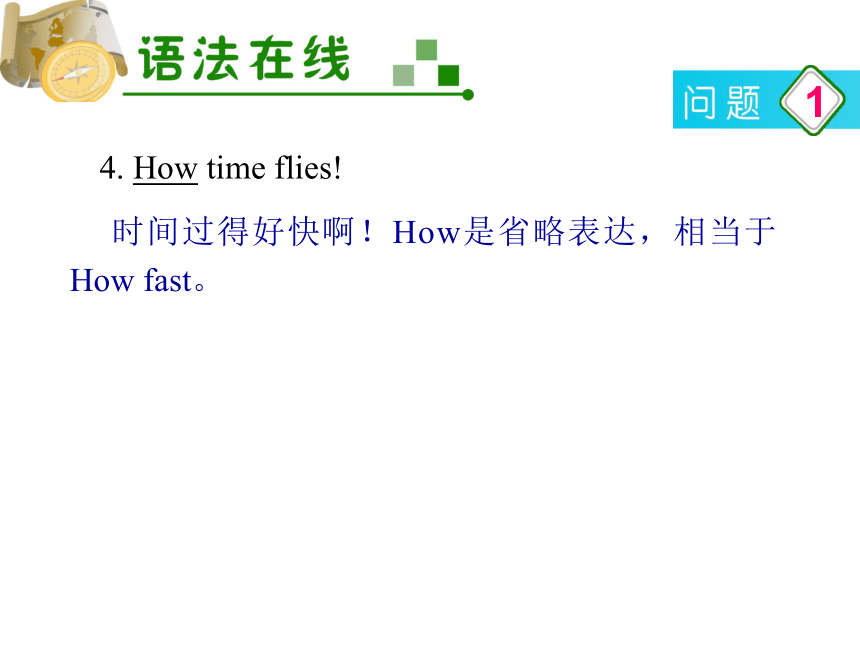


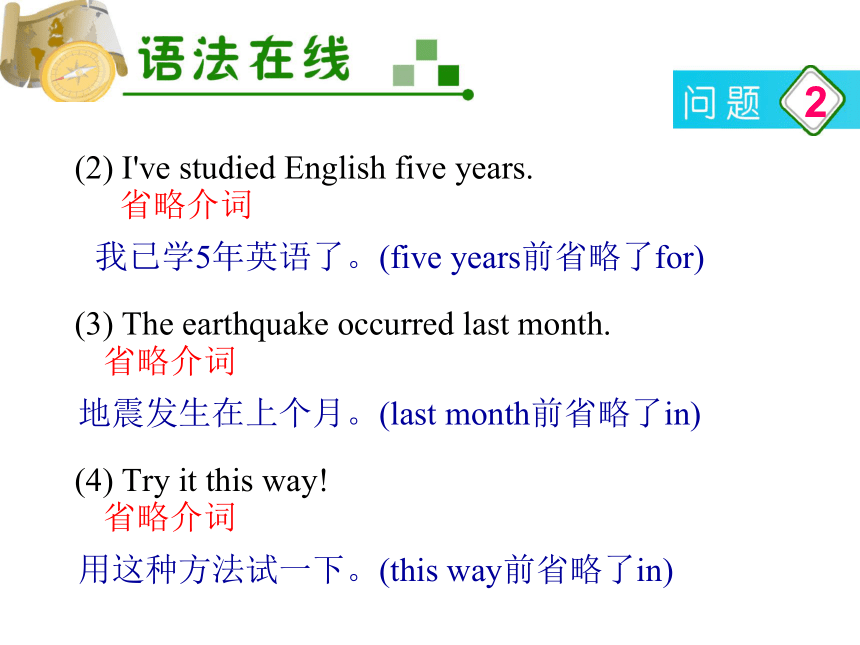
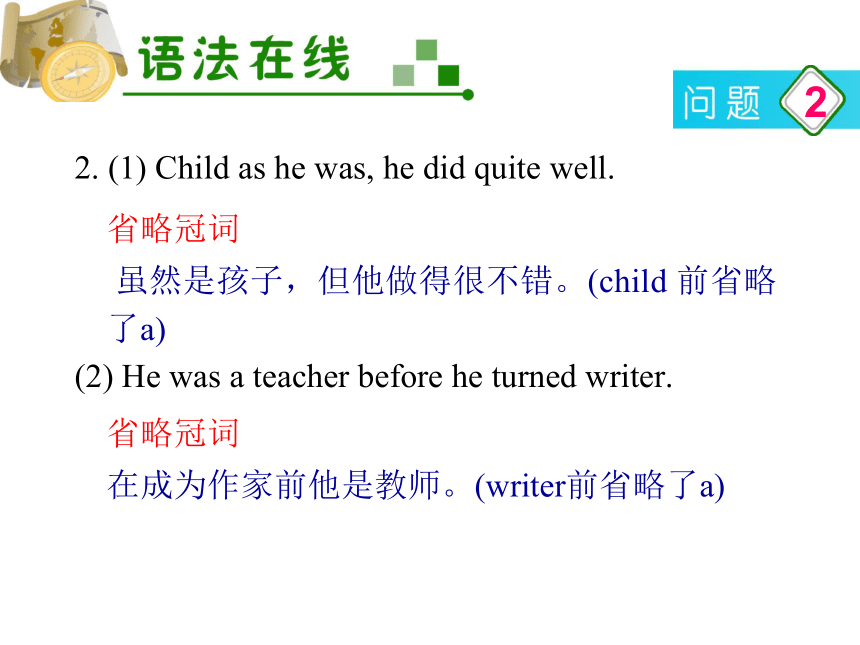
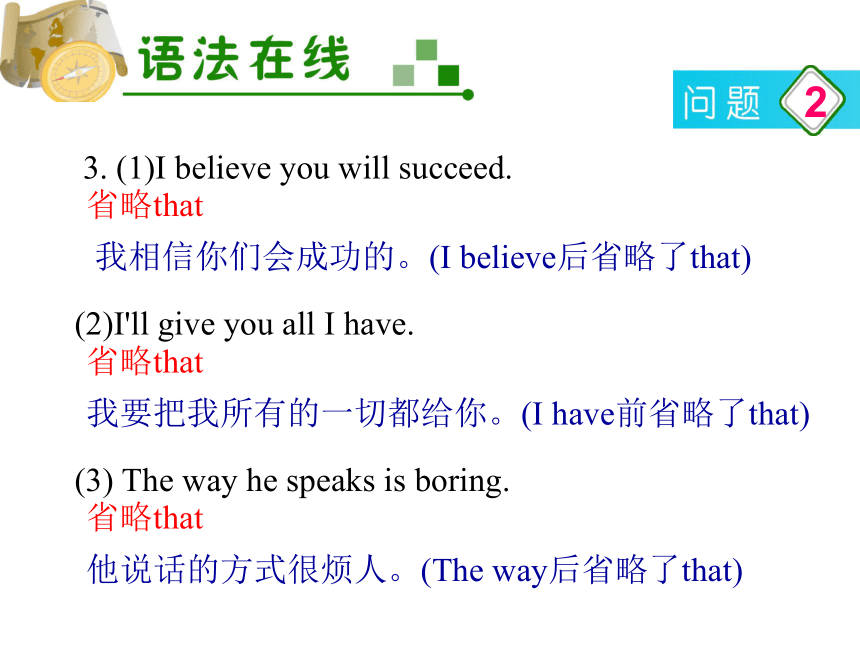
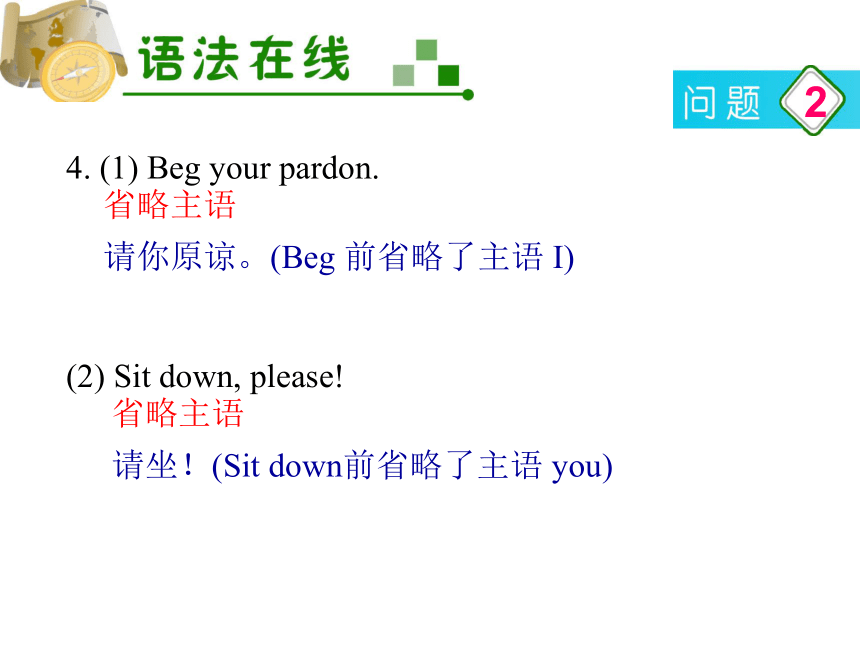

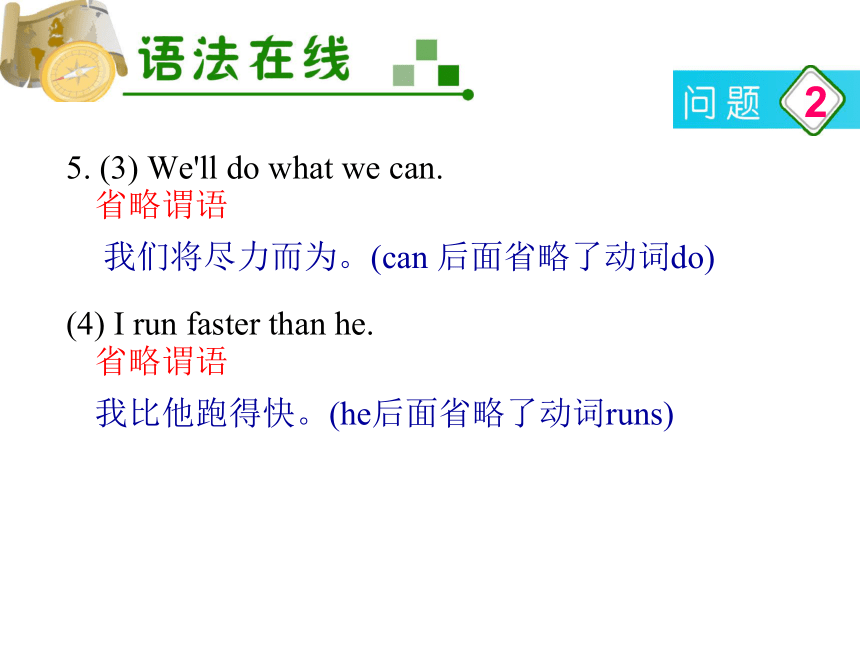

文档简介
(共72张PPT)
翻译下列句子,指出画线部分的表达特点
1. Turn to me for help if_necessary.
1
什么是英语中的省略?
如有必要来找我帮助。if necessary是省略表达,相当于if it is necessary。
一、省略
2. My brother is a doctor while_my_sister_a_nurse.
3. Do as_told_to.
1
我哥哥是医生,姐姐是护士。 while my sister a nurse是省略表达,相当于while my sister is a nurse。
按照吩咐的去做。as told to是省略表达,相当于as you are told to do it。
4. How time flies!
1
时间过得好快啊!How是省略表达,相当于How fast。
1
从语法角度而言,句子应该具备的成分,有时出于表达简洁的需要,在句中并不出现,这种语法现象称为“省略”。其特点是:虽然省去句子语法构造所需要的组成部分,但仍能表达其完整的意义。
翻译下列句子,指出各省略表达
1. (1) He spent a quarter looking through his speech.
2
省略有哪些情况?
省略介词
他花了一刻钟浏览演讲稿。(looking through 前省略了in)
(2) I've studied English five years.
(3) The earthquake occurred last month.
(4) Try it this way!
2
省略介词
我已学5年英语了。(five years前省略了for)
省略介词
地震发生在上个月。(last month前省略了in)
省略介词
用这种方法试一下。(this way前省略了in)
2. (1) Child as he was, he did quite well.
(2) He was a teacher before he turned writer.
2
省略冠词
虽然是孩子,但他做得很不错。(child 前省略了a)
省略冠词
在成为作家前他是教师。(writer前省略了a)
3. (1)I believe you will succeed.
(2)I'll give you all I have.
(3) The way he speaks is boring.
2
省略that
我相信你们会成功的。(I believe后省略了that)
省略that
我要把我所有的一切都给你。(I have前省略了that)
省略that
他说话的方式很烦人。(The way后省略了that)
4. (1) Beg your pardon.
(2) Sit down, please!
2
省略主语
请你原谅。(Beg 前省略了主语 I)
省略主语
请坐!(Sit down前省略了主语 you)
5. (1) Who next
(2)The river is deep and the mountain high.
2
省略谓语
该谁了?(Who 后面省略了谓语 comes)
省略谓语
河水很深,山很高。(mountain 后面省略了 is)
5. (3) We'll do what we can.
(4) I run faster than he.
2
省略谓语
我们将尽力而为。(can 后面省略了动词do)
省略谓语
我比他跑得快。(he后面省略了动词runs)
6. (1)Are you ready Yes, I am.
(2)He was a lover of sports as he had been in his youth.
2
省略表语
你准备好了吗? 我准备好了。(am 后面省略了 ready)
省略表语
他还是像年轻时那样,是一位运动爱好者。(had been 后面省略了 a lover of sports)
7. Let's do the dishes. I'll wash and you'll dry.
8. How he behaved!
2
省略宾语
让我们洗碗吧,我来洗,你来揩干。(wash 和 dry 后面省略了宾语the dishes)
省略well
他表现的多好啊!省略了how 后面的well
9. (1)What exciting news!
(2) How exciting a match!
2
感叹句中省略主语和连系动词
What exciting news (it is)!多么令人激动的消息啊!
感叹句中省略主语和连系动词
How exciting a match (it is)!多么令人激动的比赛啊!
10. (1)If necessary, we shall send a telegram home.
(2)Whenever possible, he will come to my help.
2
省略it is
如有必要,我们就往家里打电报。If necessary=If it is necessary。
省略it is
他一有可能就来帮助我。 Whenever possible= Whenever it is possible。
11. (1)While cycling, don't forget the traffic lights.
(2) I won't go to the party unless invited.
2
省略从句主语和be动词
骑车时,不要忘记看红绿灯。(While cycling=While you're cycling)
省略从句主语和be动词
除非被邀请否则我不会参加晚会。(unless invited=unless I am invited)
12. (1) What about having a game of chess
(2) How come they left you alone here
(3) What if it's raining
2
固定词组中的省略:
下盘棋怎么样?
固定词组中的省略:
他们怎么会把你一人留在这里呢?
固定词组中的省略:
如果天下雨怎么办?
(4) Why not try again
(5) So what
2
固定词组中的省略:
为什么不再试试呢?
固定词组中的省略:
那又怎样呢?
13. (1)He may leave if he wishes to.
(2) Don't go till I tell you to.
2
省略了不定式符号 to后面的内容。
他可以走,如果他愿意的话。(to后省略了leave)
省略了不定式符号 to后面的内容。
等我叫你走你再走。(to后省略了go)
14. (1)No parking.
(2)Not at all.
2
No或not引起的省略视上下文而定省略内容。
禁止停车。( No parking后省略了 is allowed here.)
No或not引起的省略视上下文而定省略内容。
不用谢。(Not at all=You needn't thank me at all)
15. (1)Should it rain tomorrow, we would change our plan to go on an outing.
(2)Were it not for your advice, I would be at a loss.
2
虚拟条件句中,如含有were,had,should, 可将if省略,将这些词语提前。
假如明天下雨,我们就改变郊游的计划。
虚拟条件句中,如含有were,had,should, 可将if省略,将这些词语提前。
要不是你的建议,我现在不知所措了。
(3)Had it not for the rain, the crops would have died.
2
虚拟条件句中,如含有were,had,should, 可将if省略,将这些词语提前。
要不是那场雨,庄稼已经干死了。
2
省略是在不影响上下文意思的情况下,将句子表达重复的部分或不必表达出来的部分去掉的语言现象。省略的情况比较复杂,主要情况有:
1. 省略介词。
2. 省略冠词。
3. 省略宾语从句引导词,定语从句关系代词that 及先行词为way的定语从句引导词that。
4. 祈使句中省略主语。
2
5. 口语表达或并列结构及比较句型中省略谓语。
6. 简单回答及比较句型中省略表语。
7. 上下文意思清晰时,省略宾语。
8. 感叹句中省略状语。
9. 感叹句中省略主语和连系动词。
在以 if, when, though, as if (好像)等连词引导的从句中,如从句中的谓语动词含有be,主语是it, 常将it和动词 be 省略。
2
在以 ①由if, unless等引导的条件状语从句;②由although, though, even if / though等引导的让步状语从句;③由when, while, as, before, after, until / till等引导的时间状语从句;④由as, as if等引导的方式状语从句;⑤由as, than等引导的比较状语从句中,如从句中的谓语动词含有be, 主语与主句主语一致,常将从句主语和动词 be 省略。
10. 固定句型引导的疑问句的省略。
2
11. 在口语中,为了避免重复,不定式可以省去和句子前部重复的动词原形而只留下不定式符号 to。
12. no或not引起的省略。
13. 虚拟条件句中,如含有were,had,should, 可将if省略,将这些词语提前。
翻译下列句子并分析画线部分的句子成分
1. (1)To_be_honest is the best policy.
(2)To_be_honest,_I don't like big cities like Guangzhou and Shanghai.
1
什么是插入语?
诚实乃上上策。To be honest:主语。
老实说,我不喜欢广州和上海这样的大城市。To be honest:插入语。
二、插入语
2. (1)It's generally accepted that fatness invites many diseases.
(2) Generally,_the faster drivers drive their cars, the more dangerous it will be.
1
人们普遍认为肥胖引发多种疾病。generally:状语。
一般来说,司机开车开得越快,危险性越大。Generally:插入语。
3. (1)I was once luckily the winner of the World Miss Contest and everything changed overnight.
(2)Luckily,_the accident caused no death.
1
我曾经有幸成为世界小姐大赛的优胜者,我的一切从此转眼改变。luckily:状语。
幸运的是,事故没造成死亡。luckily:插入语。
4. (1)What_surprised_me,_my friend went abroad alone without his family.
(2)What_surprised_me was that he should have set up 3 big companies in less than 5 years.
1
使我吃惊的是我的朋友抛开了家庭只身去了国外。 What surprised me: 插入语。
使我吃惊的是他竟然在不到5年的时间里开了3家大公司。What surprised me: 主语。
1
英语中的插入语是插在句子中的一个词,短语或从句,通常被逗号、破折号或句子的其他部分隔开,它与句子的其他部分之间没有语法上的关系,因此,也可称为独立成分。
插入语在句中通常是对一句话的一些附加解释,说明或总结;有时表示说话者的态度和看法;有时起强调的作用;有时是为了引起对方的注意;还可以起转移话题或说明事由的作用;也可以承上
1
启下,使句子与前面的语句衔接得更为紧密。插入语虽然不是句子的主干成分,但插入语的准确使用,会起到润色句子,使句子生色的作用。
翻译下列句子,指出句中插入语的类型
1. Strange, there is nobody in the classroom.
2
插入语有哪些类型?
很奇怪,教室里没人。形容词Strange作插入语。
2. Luckily for you, I happen to have the key.
3. In short, we should not stop halfway.
2
你很幸运,我正好带了钥匙。副词短语Luckily for you作插入语。
简言之,我们不能半途而废。介词短语In short作插入语。
4. Considering his age, he did very well.
5. Given the general state of his health, it may take him a while to recover from the operation.
2
从年龄考虑,他干得挺不错。现在分词短语Considering his age作插入语。
鉴于他的健康状况,手术后康复还需要一段时间。过去分词短语Given the general state of his health作插入语。
6. To be frank, I don't quite agree with you.
7. All in all, her condition is greatly improved.
2
坦率地说,我不太同意你的意见。动词不定式To be frank作插入语。
总的来说,她的情况有很大好转。代词词组All in all作插入语。
8. If I may say so, we know nothing about it.
9. It's a great mistake, I think, not to accept their proposal.
2
正如我所说的,我们对它一无所知。从句If I may say so作插入语。
依我看,不接受他们的建议是个大错误。句子I think作插入语。
2
插入语大致可分为以下9种类型:
1. 形容词或形容词短语作插入语。
如:worse still, sure enough, strange, most important of all等。
2. 副词或副词短语作插入语。
如:personally, honestly, fortunately, luckily, for us, though, besides, exactly, surely, frankly, still, otherwise 等。
2
3. 介词短语作插入语。
如:of course, in short, as a matter of fact, by the way, on the other hand, in my opinion, in conclusion, in other words, above all等。
4. 现在分词短语作插入语。
如:generally speaking, judging from/ by …, talking of…, considering…等。
5. 过去分词短语作插入语。
2
如:Given…/Provided…
6. 动词不定式作插入语。
如:to be sure, to be frank,to tell you the truth,to be honest,to cut a long story short,to be exact,to put it another way,to put it simply等。
7. 代词词组作插入语。
如:all the same,all in all等。
2
8. 从句。
如:if so / not / any, if I may say so, if you don't mind, as you know, as you say
9. 句子作插入语。
如:I say /hear, I think /hope / believe, you know / see, what's more, that is (to say), I'm afraid, do you think / suppose等。
注意:插入语如不在句首,前后应有标点隔开。
翻译下列句子,指出下列疑问句的类型
1. Are you interested in Chinese calligraphy
1
什么叫反意疑问句?
你喜欢中国书法吗? 一般疑问句。
三、反意疑问句
2. Do you like sports or music
3. How is everything going
1
你喜欢运动还是音乐?选择疑问句。
情况怎样? 特殊疑问句。
4. Didn't you ask me to come here for a book
5. Why not go on a holiday to relax yourself
1
你不是要我来拿一本书吗? 修辞疑问句(反问句)。
何不去度假放松一下?修辞疑问句。
6. Nobody is perfect, are they
1
没有人是十全十美的,是吗? 反意疑问句。
1
疑问句有很多形式,反意疑问句是疑问句的一种, 由前后两个部分组成。前一部分是对人或事物的陈述,后一部分是简短的提问。一般情况下,若陈述部分用肯定式,则疑问部分用否定式;反之,若陈述部分用否定式,则疑问部分用肯定式。反意疑问句既可以表示真实疑问,也可以表示说话人的某种倾向、强调或反问。
完成下列反意疑问句
1. The students and their teacher are discussing how to improve their teaching efficiency, __________?
2. The residents didn‘t agree to the former housing plan, __________?
3. He dislikes having porridge for breakfast, __________?
2
学习反意疑问句应注意哪些方面?
aren't they
did they
doesn't he
4. I don't believe such a theory holds water, __________?
5. Everything is ready, __________?
6. There seem to be 5 free buses to go to the mall, __________?
2
does it
isn‘t it
don't there
2
学习反意疑问句应重点注意四点:
1.肯定和否定形式的选择。一般情况下,肯定和否定交错出现。但具体情况比较复杂,如加前缀,后缀构成的否定词视为肯定情况,那么疑问部分用否定。
2.主语的确定。主语应转化为代词,而且要注意其单复数。如everything作主语,用单数代词it提问,但everybody作主语,用复数代词they提问。因
2
此, 要把握常见句式提问时主语的规律性。
3.时态的照应。提问应注意前后时态的一致性。
4.复合句中要注意就主句提问还是从句提问。一般情况下,就主句提问,但否定前移的句式就从句提问。
学习反意疑问句的难点是要掌握足够量的典型句式,准确把握其正确用法。
完成下列反意疑问句
1. Dogs aren't friendly to cats, __________?
2. Let's have further discussion about it, __________?
3. Don't forget to phone me, __________?
3
反意疑问句常见句式有哪些?
are they
will you
shall we
4. He seldom watches TV, __________?
5. John said nobody was fit for the job, __________?
6. Nothing can stop us now, __________?
7. Someone is waiting for you, __________?
8. There seemed to be any trouble, __________?
9. We had to take the first train, __________?
3
does he
didn't he
can it
aren't they
didn't there
didn't we
10. My brother often has colds, __________?
11. I must answer the letter, ______________ ?
12. You must have studied English for many years, __________?
13. You'd like to have some tea, __________?
14. What beautiful weather, __________?
15. It is Tom and Jack who often play football, __________?
3
doesn't he
needn't I / mustn't I
haven't you
wouldn't you
isn't it
isn't it
16. Who was responsible for the accident is not yet clear, __________?
17. Burns dislikes dancing, __________?
18. Learning how to repair motors takes him a long time, __________?
19. I wish to go home now, __________?
20. I'm interested in English, __________?
3
is it
doesn't he
doesn't it
may I
aren't I
21. The Turners often go to the cinema on Sunday, __________?
22. That's not important, __________?
23. Everyone is here, __________?
24. Neither of the books is interesting, __________?
25. It's impossible, __________?
26. He has a good time on Sunday, __________?
3
don't they
is it
aren't they
are they
isn't it
doesn't he
27. You'd better go and ask for her now, __________?
28. I need help very much, __________?
29. He must be in the classroom, __________?
30. Please try on the coat, __________ ?
31. So you are right, __________?
32. What a lovely day, __________?
3
hadn't you
don't I
isn't he
will you/ won't you
are you
isn't it
33. He said he was going to help me, __________?
34. We're not going to stay with our parents this summer, __________?
35. Neither you nor I am a doctor, __________?
36. You'd like to help with my work after school, __________?
37. I don't believe that he will come on time, __________?
3
didn't he
are we
are we
wouldn't you
will he
38. You don't know when the building will be completed, __________?
39. Tom has been reading stories, but he didn't read this afternoon, __________?
40. That China is a great socialist country is well known, __________?
41. There is little ink in my pen, __________?
42. She dislikes smoking, __________?
3
do you
did he
isn't it
is there
doesn't she
43. He ought to go and ask him, _______________ ?
44. He used to get up early, ________________?
45. He has to go to see the doctor, __________?
46. We must study all the subjects well, __________?
47. You must have lost the book yesterday, __________?
3
oughtn't he/ shouldn't he
usedn't he/ didn't he
doesn't he
needn't we
didn't you
48. The girl daren't go home alone, __________?
49. Don't forget to write a letter to me, __________?
50. I don't suppose you can finish the work in time,__________?
51. It's my son's wedding and I'll have to look my best for it, __________?
3
dare she
will you
can you
won't I
52. Let me help you,__________?
may I
3
反意疑问句主要句式总结如下:
1. there be 句型中,反意疑问部分的主语用there。
2. I'm 结构中,反意疑问部分一般用aren't I。
3. 当陈述部分为主从复合句时,反意疑问部分通常就主句提问。
4. 主句为I think/I don't think, I suppose/I don't suppose, I believe/I don't believe的复合句时,反意疑问部分就从句提问,且要注意否定的转移。
3
5.谓语动词为have/has/had,表示“有”含义时反意疑问部分可直接就其提问,也可以借助助动词does/do/did提问。谓语动词为have/has/had,不表示“有”含义时反意疑问部分只能借助助动词does/do/did提问。
6.当陈述部分带有never, nothing, nowhere, seldom, hardly, rarely, few, little 等否定词或半否定词时,反意疑问部分的动词用肯定形式。
3
7.当陈述部分的谓语动词是带有un ,in ,dis 等否定前缀的动词,则仍然把陈述部分看作肯定句,反意疑问部分用否定形式。
8.当陈述部分带有情态动词ought to时,反意疑问部分在英式英语中可用ought也可用should形式。
3
9.当陈述部分带有情态动词must时,反意疑问部分需视must的含义而定。当must表示“命令或强制”时,反意疑问部分用mustn't。 当must表示“有必要”时,反意疑问句用needn't。当must表示推测意义时,反意疑问部分不用mustn't,而根据对应的实际时态分别就一般现在时、现在进行时、一般过去时,现在完成时提问。
3
10.当陈述部分带有need/dare时,根据need/dare的情态动词用法或实义动词用法来提问。
11.had better或 would rather/would like 时,反意疑问部分就had 或would提问。have to 借助助动词提问。
12.当陈述部分是肯定形式祈使句时,反意疑问部分一般用will you (would you),won't you。当陈述部分是否定形式祈使句时,反意疑问部分一般用will you (would you)。
3
13.Let's开头的祈使句时,反意疑问部分用shall we; Let us 开头的祈使句,反意疑问部分则用will you。
14.I wish…或Let me …开头的祈使句,用May I提问。
15.非谓语动词作主语,常用it提问。
16.主语为句子,常用it提问。
17.It is /was…that强调句型, 常用it提问。
3
18.陈述部分主语是指示代词或不定代词everything, that, nothing, this, 疑问部分主语用it。
19.陈述部分主语是不定代词everybody, anyone, somebody, nobody, no one等,疑问部分常用复数they。
20.并列复合句的疑问部分,就邻近分句提问。
21.陈述部分由neither…nor…, either…or…等连接的并列主语时,疑问部分根据其实际逻辑意义而定。
3
22.陈述部分前有强调词,此时为反问语气,后面提问的肯定、否定形式与前面保持一致。
23.感叹句省略主语时,要就原来的主语提问。
根据实际情况回答下列反意疑问句
1. — North Korea is a socialist country,isn't it
— ____________________.
2. — India isn't a developing country,is it
— ____________________.
4
反意疑问句怎样回答?
Yes,it is
Yes, it is
3. — Beijing isn't the capital of China, is it
— ____________________.
4. — Shanghai isn't the capital of China, is it
— ____________________.
No, it isn't
4
Yes, it is
4
反意疑问句的回答分两种情况理解。当陈述部分是肯定时,与汉语回答是一致的,因而容易理解。重点是要掌握陈述部分为否定时,与汉语回答的不同之处。换言之,要排除汉语干扰,培养英语思维。陈述部分为否定的反意疑问句回答时注意三点。第一,回答时先完整地回答句子。如:India is a developing country(而不是简单回答It is); 第二,判断完整回答中的肯定或否定形式;第三,根据肯定或
4
否定形式确定Yes或No,肯定用Yes否定用NO,注意回答的一致性。以“Shanghai isn't the capital of China, is it?”为例,第一,回答时先完整地回答句子: Shanghai is not the capital of China.(上海当然不是中国的首都); 第二,判断完整回答中的肯定或否定形式:否定;第三,根据否定形式确定No.注意回答的一致性:No,it isn't.可见,在陈述部分为否定的反意疑问句的回答中,Yes翻译成“不”,而No翻译成“是”。
翻译下列句子,指出画线部分的表达特点
1. Turn to me for help if_necessary.
1
什么是英语中的省略?
如有必要来找我帮助。if necessary是省略表达,相当于if it is necessary。
一、省略
2. My brother is a doctor while_my_sister_a_nurse.
3. Do as_told_to.
1
我哥哥是医生,姐姐是护士。 while my sister a nurse是省略表达,相当于while my sister is a nurse。
按照吩咐的去做。as told to是省略表达,相当于as you are told to do it。
4. How time flies!
1
时间过得好快啊!How是省略表达,相当于How fast。
1
从语法角度而言,句子应该具备的成分,有时出于表达简洁的需要,在句中并不出现,这种语法现象称为“省略”。其特点是:虽然省去句子语法构造所需要的组成部分,但仍能表达其完整的意义。
翻译下列句子,指出各省略表达
1. (1) He spent a quarter looking through his speech.
2
省略有哪些情况?
省略介词
他花了一刻钟浏览演讲稿。(looking through 前省略了in)
(2) I've studied English five years.
(3) The earthquake occurred last month.
(4) Try it this way!
2
省略介词
我已学5年英语了。(five years前省略了for)
省略介词
地震发生在上个月。(last month前省略了in)
省略介词
用这种方法试一下。(this way前省略了in)
2. (1) Child as he was, he did quite well.
(2) He was a teacher before he turned writer.
2
省略冠词
虽然是孩子,但他做得很不错。(child 前省略了a)
省略冠词
在成为作家前他是教师。(writer前省略了a)
3. (1)I believe you will succeed.
(2)I'll give you all I have.
(3) The way he speaks is boring.
2
省略that
我相信你们会成功的。(I believe后省略了that)
省略that
我要把我所有的一切都给你。(I have前省略了that)
省略that
他说话的方式很烦人。(The way后省略了that)
4. (1) Beg your pardon.
(2) Sit down, please!
2
省略主语
请你原谅。(Beg 前省略了主语 I)
省略主语
请坐!(Sit down前省略了主语 you)
5. (1) Who next
(2)The river is deep and the mountain high.
2
省略谓语
该谁了?(Who 后面省略了谓语 comes)
省略谓语
河水很深,山很高。(mountain 后面省略了 is)
5. (3) We'll do what we can.
(4) I run faster than he.
2
省略谓语
我们将尽力而为。(can 后面省略了动词do)
省略谓语
我比他跑得快。(he后面省略了动词runs)
6. (1)Are you ready Yes, I am.
(2)He was a lover of sports as he had been in his youth.
2
省略表语
你准备好了吗? 我准备好了。(am 后面省略了 ready)
省略表语
他还是像年轻时那样,是一位运动爱好者。(had been 后面省略了 a lover of sports)
7. Let's do the dishes. I'll wash and you'll dry.
8. How he behaved!
2
省略宾语
让我们洗碗吧,我来洗,你来揩干。(wash 和 dry 后面省略了宾语the dishes)
省略well
他表现的多好啊!省略了how 后面的well
9. (1)What exciting news!
(2) How exciting a match!
2
感叹句中省略主语和连系动词
What exciting news (it is)!多么令人激动的消息啊!
感叹句中省略主语和连系动词
How exciting a match (it is)!多么令人激动的比赛啊!
10. (1)If necessary, we shall send a telegram home.
(2)Whenever possible, he will come to my help.
2
省略it is
如有必要,我们就往家里打电报。If necessary=If it is necessary。
省略it is
他一有可能就来帮助我。 Whenever possible= Whenever it is possible。
11. (1)While cycling, don't forget the traffic lights.
(2) I won't go to the party unless invited.
2
省略从句主语和be动词
骑车时,不要忘记看红绿灯。(While cycling=While you're cycling)
省略从句主语和be动词
除非被邀请否则我不会参加晚会。(unless invited=unless I am invited)
12. (1) What about having a game of chess
(2) How come they left you alone here
(3) What if it's raining
2
固定词组中的省略:
下盘棋怎么样?
固定词组中的省略:
他们怎么会把你一人留在这里呢?
固定词组中的省略:
如果天下雨怎么办?
(4) Why not try again
(5) So what
2
固定词组中的省略:
为什么不再试试呢?
固定词组中的省略:
那又怎样呢?
13. (1)He may leave if he wishes to.
(2) Don't go till I tell you to.
2
省略了不定式符号 to后面的内容。
他可以走,如果他愿意的话。(to后省略了leave)
省略了不定式符号 to后面的内容。
等我叫你走你再走。(to后省略了go)
14. (1)No parking.
(2)Not at all.
2
No或not引起的省略视上下文而定省略内容。
禁止停车。( No parking后省略了 is allowed here.)
No或not引起的省略视上下文而定省略内容。
不用谢。(Not at all=You needn't thank me at all)
15. (1)Should it rain tomorrow, we would change our plan to go on an outing.
(2)Were it not for your advice, I would be at a loss.
2
虚拟条件句中,如含有were,had,should, 可将if省略,将这些词语提前。
假如明天下雨,我们就改变郊游的计划。
虚拟条件句中,如含有were,had,should, 可将if省略,将这些词语提前。
要不是你的建议,我现在不知所措了。
(3)Had it not for the rain, the crops would have died.
2
虚拟条件句中,如含有were,had,should, 可将if省略,将这些词语提前。
要不是那场雨,庄稼已经干死了。
2
省略是在不影响上下文意思的情况下,将句子表达重复的部分或不必表达出来的部分去掉的语言现象。省略的情况比较复杂,主要情况有:
1. 省略介词。
2. 省略冠词。
3. 省略宾语从句引导词,定语从句关系代词that 及先行词为way的定语从句引导词that。
4. 祈使句中省略主语。
2
5. 口语表达或并列结构及比较句型中省略谓语。
6. 简单回答及比较句型中省略表语。
7. 上下文意思清晰时,省略宾语。
8. 感叹句中省略状语。
9. 感叹句中省略主语和连系动词。
在以 if, when, though, as if (好像)等连词引导的从句中,如从句中的谓语动词含有be,主语是it, 常将it和动词 be 省略。
2
在以 ①由if, unless等引导的条件状语从句;②由although, though, even if / though等引导的让步状语从句;③由when, while, as, before, after, until / till等引导的时间状语从句;④由as, as if等引导的方式状语从句;⑤由as, than等引导的比较状语从句中,如从句中的谓语动词含有be, 主语与主句主语一致,常将从句主语和动词 be 省略。
10. 固定句型引导的疑问句的省略。
2
11. 在口语中,为了避免重复,不定式可以省去和句子前部重复的动词原形而只留下不定式符号 to。
12. no或not引起的省略。
13. 虚拟条件句中,如含有were,had,should, 可将if省略,将这些词语提前。
翻译下列句子并分析画线部分的句子成分
1. (1)To_be_honest is the best policy.
(2)To_be_honest,_I don't like big cities like Guangzhou and Shanghai.
1
什么是插入语?
诚实乃上上策。To be honest:主语。
老实说,我不喜欢广州和上海这样的大城市。To be honest:插入语。
二、插入语
2. (1)It's generally accepted that fatness invites many diseases.
(2) Generally,_the faster drivers drive their cars, the more dangerous it will be.
1
人们普遍认为肥胖引发多种疾病。generally:状语。
一般来说,司机开车开得越快,危险性越大。Generally:插入语。
3. (1)I was once luckily the winner of the World Miss Contest and everything changed overnight.
(2)Luckily,_the accident caused no death.
1
我曾经有幸成为世界小姐大赛的优胜者,我的一切从此转眼改变。luckily:状语。
幸运的是,事故没造成死亡。luckily:插入语。
4. (1)What_surprised_me,_my friend went abroad alone without his family.
(2)What_surprised_me was that he should have set up 3 big companies in less than 5 years.
1
使我吃惊的是我的朋友抛开了家庭只身去了国外。 What surprised me: 插入语。
使我吃惊的是他竟然在不到5年的时间里开了3家大公司。What surprised me: 主语。
1
英语中的插入语是插在句子中的一个词,短语或从句,通常被逗号、破折号或句子的其他部分隔开,它与句子的其他部分之间没有语法上的关系,因此,也可称为独立成分。
插入语在句中通常是对一句话的一些附加解释,说明或总结;有时表示说话者的态度和看法;有时起强调的作用;有时是为了引起对方的注意;还可以起转移话题或说明事由的作用;也可以承上
1
启下,使句子与前面的语句衔接得更为紧密。插入语虽然不是句子的主干成分,但插入语的准确使用,会起到润色句子,使句子生色的作用。
翻译下列句子,指出句中插入语的类型
1. Strange, there is nobody in the classroom.
2
插入语有哪些类型?
很奇怪,教室里没人。形容词Strange作插入语。
2. Luckily for you, I happen to have the key.
3. In short, we should not stop halfway.
2
你很幸运,我正好带了钥匙。副词短语Luckily for you作插入语。
简言之,我们不能半途而废。介词短语In short作插入语。
4. Considering his age, he did very well.
5. Given the general state of his health, it may take him a while to recover from the operation.
2
从年龄考虑,他干得挺不错。现在分词短语Considering his age作插入语。
鉴于他的健康状况,手术后康复还需要一段时间。过去分词短语Given the general state of his health作插入语。
6. To be frank, I don't quite agree with you.
7. All in all, her condition is greatly improved.
2
坦率地说,我不太同意你的意见。动词不定式To be frank作插入语。
总的来说,她的情况有很大好转。代词词组All in all作插入语。
8. If I may say so, we know nothing about it.
9. It's a great mistake, I think, not to accept their proposal.
2
正如我所说的,我们对它一无所知。从句If I may say so作插入语。
依我看,不接受他们的建议是个大错误。句子I think作插入语。
2
插入语大致可分为以下9种类型:
1. 形容词或形容词短语作插入语。
如:worse still, sure enough, strange, most important of all等。
2. 副词或副词短语作插入语。
如:personally, honestly, fortunately, luckily, for us, though, besides, exactly, surely, frankly, still, otherwise 等。
2
3. 介词短语作插入语。
如:of course, in short, as a matter of fact, by the way, on the other hand, in my opinion, in conclusion, in other words, above all等。
4. 现在分词短语作插入语。
如:generally speaking, judging from/ by …, talking of…, considering…等。
5. 过去分词短语作插入语。
2
如:Given…/Provided…
6. 动词不定式作插入语。
如:to be sure, to be frank,to tell you the truth,to be honest,to cut a long story short,to be exact,to put it another way,to put it simply等。
7. 代词词组作插入语。
如:all the same,all in all等。
2
8. 从句。
如:if so / not / any, if I may say so, if you don't mind, as you know, as you say
9. 句子作插入语。
如:I say /hear, I think /hope / believe, you know / see, what's more, that is (to say), I'm afraid, do you think / suppose等。
注意:插入语如不在句首,前后应有标点隔开。
翻译下列句子,指出下列疑问句的类型
1. Are you interested in Chinese calligraphy
1
什么叫反意疑问句?
你喜欢中国书法吗? 一般疑问句。
三、反意疑问句
2. Do you like sports or music
3. How is everything going
1
你喜欢运动还是音乐?选择疑问句。
情况怎样? 特殊疑问句。
4. Didn't you ask me to come here for a book
5. Why not go on a holiday to relax yourself
1
你不是要我来拿一本书吗? 修辞疑问句(反问句)。
何不去度假放松一下?修辞疑问句。
6. Nobody is perfect, are they
1
没有人是十全十美的,是吗? 反意疑问句。
1
疑问句有很多形式,反意疑问句是疑问句的一种, 由前后两个部分组成。前一部分是对人或事物的陈述,后一部分是简短的提问。一般情况下,若陈述部分用肯定式,则疑问部分用否定式;反之,若陈述部分用否定式,则疑问部分用肯定式。反意疑问句既可以表示真实疑问,也可以表示说话人的某种倾向、强调或反问。
完成下列反意疑问句
1. The students and their teacher are discussing how to improve their teaching efficiency, __________?
2. The residents didn‘t agree to the former housing plan, __________?
3. He dislikes having porridge for breakfast, __________?
2
学习反意疑问句应注意哪些方面?
aren't they
did they
doesn't he
4. I don't believe such a theory holds water, __________?
5. Everything is ready, __________?
6. There seem to be 5 free buses to go to the mall, __________?
2
does it
isn‘t it
don't there
2
学习反意疑问句应重点注意四点:
1.肯定和否定形式的选择。一般情况下,肯定和否定交错出现。但具体情况比较复杂,如加前缀,后缀构成的否定词视为肯定情况,那么疑问部分用否定。
2.主语的确定。主语应转化为代词,而且要注意其单复数。如everything作主语,用单数代词it提问,但everybody作主语,用复数代词they提问。因
2
此, 要把握常见句式提问时主语的规律性。
3.时态的照应。提问应注意前后时态的一致性。
4.复合句中要注意就主句提问还是从句提问。一般情况下,就主句提问,但否定前移的句式就从句提问。
学习反意疑问句的难点是要掌握足够量的典型句式,准确把握其正确用法。
完成下列反意疑问句
1. Dogs aren't friendly to cats, __________?
2. Let's have further discussion about it, __________?
3. Don't forget to phone me, __________?
3
反意疑问句常见句式有哪些?
are they
will you
shall we
4. He seldom watches TV, __________?
5. John said nobody was fit for the job, __________?
6. Nothing can stop us now, __________?
7. Someone is waiting for you, __________?
8. There seemed to be any trouble, __________?
9. We had to take the first train, __________?
3
does he
didn't he
can it
aren't they
didn't there
didn't we
10. My brother often has colds, __________?
11. I must answer the letter, ______________ ?
12. You must have studied English for many years, __________?
13. You'd like to have some tea, __________?
14. What beautiful weather, __________?
15. It is Tom and Jack who often play football, __________?
3
doesn't he
needn't I / mustn't I
haven't you
wouldn't you
isn't it
isn't it
16. Who was responsible for the accident is not yet clear, __________?
17. Burns dislikes dancing, __________?
18. Learning how to repair motors takes him a long time, __________?
19. I wish to go home now, __________?
20. I'm interested in English, __________?
3
is it
doesn't he
doesn't it
may I
aren't I
21. The Turners often go to the cinema on Sunday, __________?
22. That's not important, __________?
23. Everyone is here, __________?
24. Neither of the books is interesting, __________?
25. It's impossible, __________?
26. He has a good time on Sunday, __________?
3
don't they
is it
aren't they
are they
isn't it
doesn't he
27. You'd better go and ask for her now, __________?
28. I need help very much, __________?
29. He must be in the classroom, __________?
30. Please try on the coat, __________ ?
31. So you are right, __________?
32. What a lovely day, __________?
3
hadn't you
don't I
isn't he
will you/ won't you
are you
isn't it
33. He said he was going to help me, __________?
34. We're not going to stay with our parents this summer, __________?
35. Neither you nor I am a doctor, __________?
36. You'd like to help with my work after school, __________?
37. I don't believe that he will come on time, __________?
3
didn't he
are we
are we
wouldn't you
will he
38. You don't know when the building will be completed, __________?
39. Tom has been reading stories, but he didn't read this afternoon, __________?
40. That China is a great socialist country is well known, __________?
41. There is little ink in my pen, __________?
42. She dislikes smoking, __________?
3
do you
did he
isn't it
is there
doesn't she
43. He ought to go and ask him, _______________ ?
44. He used to get up early, ________________?
45. He has to go to see the doctor, __________?
46. We must study all the subjects well, __________?
47. You must have lost the book yesterday, __________?
3
oughtn't he/ shouldn't he
usedn't he/ didn't he
doesn't he
needn't we
didn't you
48. The girl daren't go home alone, __________?
49. Don't forget to write a letter to me, __________?
50. I don't suppose you can finish the work in time,__________?
51. It's my son's wedding and I'll have to look my best for it, __________?
3
dare she
will you
can you
won't I
52. Let me help you,__________?
may I
3
反意疑问句主要句式总结如下:
1. there be 句型中,反意疑问部分的主语用there。
2. I'm 结构中,反意疑问部分一般用aren't I。
3. 当陈述部分为主从复合句时,反意疑问部分通常就主句提问。
4. 主句为I think/I don't think, I suppose/I don't suppose, I believe/I don't believe的复合句时,反意疑问部分就从句提问,且要注意否定的转移。
3
5.谓语动词为have/has/had,表示“有”含义时反意疑问部分可直接就其提问,也可以借助助动词does/do/did提问。谓语动词为have/has/had,不表示“有”含义时反意疑问部分只能借助助动词does/do/did提问。
6.当陈述部分带有never, nothing, nowhere, seldom, hardly, rarely, few, little 等否定词或半否定词时,反意疑问部分的动词用肯定形式。
3
7.当陈述部分的谓语动词是带有un ,in ,dis 等否定前缀的动词,则仍然把陈述部分看作肯定句,反意疑问部分用否定形式。
8.当陈述部分带有情态动词ought to时,反意疑问部分在英式英语中可用ought也可用should形式。
3
9.当陈述部分带有情态动词must时,反意疑问部分需视must的含义而定。当must表示“命令或强制”时,反意疑问部分用mustn't。 当must表示“有必要”时,反意疑问句用needn't。当must表示推测意义时,反意疑问部分不用mustn't,而根据对应的实际时态分别就一般现在时、现在进行时、一般过去时,现在完成时提问。
3
10.当陈述部分带有need/dare时,根据need/dare的情态动词用法或实义动词用法来提问。
11.had better或 would rather/would like 时,反意疑问部分就had 或would提问。have to 借助助动词提问。
12.当陈述部分是肯定形式祈使句时,反意疑问部分一般用will you (would you),won't you。当陈述部分是否定形式祈使句时,反意疑问部分一般用will you (would you)。
3
13.Let's开头的祈使句时,反意疑问部分用shall we; Let us 开头的祈使句,反意疑问部分则用will you。
14.I wish…或Let me …开头的祈使句,用May I提问。
15.非谓语动词作主语,常用it提问。
16.主语为句子,常用it提问。
17.It is /was…that强调句型, 常用it提问。
3
18.陈述部分主语是指示代词或不定代词everything, that, nothing, this, 疑问部分主语用it。
19.陈述部分主语是不定代词everybody, anyone, somebody, nobody, no one等,疑问部分常用复数they。
20.并列复合句的疑问部分,就邻近分句提问。
21.陈述部分由neither…nor…, either…or…等连接的并列主语时,疑问部分根据其实际逻辑意义而定。
3
22.陈述部分前有强调词,此时为反问语气,后面提问的肯定、否定形式与前面保持一致。
23.感叹句省略主语时,要就原来的主语提问。
根据实际情况回答下列反意疑问句
1. — North Korea is a socialist country,isn't it
— ____________________.
2. — India isn't a developing country,is it
— ____________________.
4
反意疑问句怎样回答?
Yes,it is
Yes, it is
3. — Beijing isn't the capital of China, is it
— ____________________.
4. — Shanghai isn't the capital of China, is it
— ____________________.
No, it isn't
4
Yes, it is
4
反意疑问句的回答分两种情况理解。当陈述部分是肯定时,与汉语回答是一致的,因而容易理解。重点是要掌握陈述部分为否定时,与汉语回答的不同之处。换言之,要排除汉语干扰,培养英语思维。陈述部分为否定的反意疑问句回答时注意三点。第一,回答时先完整地回答句子。如:India is a developing country(而不是简单回答It is); 第二,判断完整回答中的肯定或否定形式;第三,根据肯定或
4
否定形式确定Yes或No,肯定用Yes否定用NO,注意回答的一致性。以“Shanghai isn't the capital of China, is it?”为例,第一,回答时先完整地回答句子: Shanghai is not the capital of China.(上海当然不是中国的首都); 第二,判断完整回答中的肯定或否定形式:否定;第三,根据否定形式确定No.注意回答的一致性:No,it isn't.可见,在陈述部分为否定的反意疑问句的回答中,Yes翻译成“不”,而No翻译成“是”。
